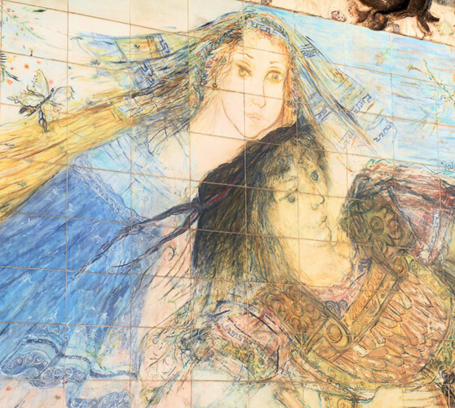

The allure of history intertwines with legendary tales, between the deep blue sea and lush green landscapes.




Nestled between the crystal-clear waters of the Ionian Sea, Taranto owes its name and origins to a remarkable myth. According to legend, Taras, son of the powerful sea god Poseidon and the nymph Satyria, was sent to the Ionian shores by his father to found a prosperous and significant city. Taras arrived riding a dolphin, a symbol of divine protection and guidance, which led him to a welcoming land where the sea met fertile inland territories. It was there that he decided to settle and establish the city we now know as Taranto.
This myth is not merely a tale but an essential part of the city’s identity. The coat of arms of Taranto depicts a youth riding a dolphin, celebrating the deep connection between the city and the sea, an element vital to its history, culture, and development. The figure of Taras, a symbol of protection and divine foundation, reflects Taranto’s historical bond with the sea—not only as an economic resource but as an integral part of its character and soul. Even today, this legend echoes in local traditions, giving the city a unique charm rooted in a mythical and extraordinary past.
The legend of Phalanthus is deeply linked to the founding of Taranto and reflects the complex social dynamics of ancient Sparta. During the Messenian Wars, many Spartan men were forced into prolonged military campaigns, leaving their wives behind. From these unions, the Partheniae were born—illegitimate children without full civil rights. Phalanthus, one of them, became the leader of this marginalized group. Faced with growing internal tensions, the Spartans decided to send the Partheniae to establish a colony, entrusting Phalanthus with the mission.
Before departing, Phalanthus consulted the Oracle of Delphi, which prophesied that he would found a city when he saw 'rain falling from a clear sky.'' Initially perplexed, Phalanthus did not understand the prophecy until a pivotal moment: as he rested his head on the lap of his wife, Aethra, whose name means 'clear sky,' she began to weep, her tears falling onto his face. Realizing that this was the 'rain from a clear sky' foretold by the Oracle, Phalanthus understood that it was time to establish the new colony.
Leading the Partheniae, Phalanthus set sail for Southern Italy, eventually landing on the shores of present-day Taranto, near the Tara River. After conflicts with the local populations, they succeeded in founding the city, the only Spartan colony in the West. The settlement grew into a major center of Magna Graecia, spreading Spartan culture and traditions throughout the region.
Arion, a renowned poet and musician from Methymna on the island of Lesbos, was famous in antiquity for his extraordinary skill in playing the lyre, an instrument that gave voice to his soul and artistry. After spending time at the court of Periander, tyrant of Corinth, he embarked on a journey to Italy and Sicily, where his performances brought him great fame and fortune.
However, his return to Corinth became a harrowing ordeal. Boarding a ship in Taranto, Arion found himself the target of a treacherous plot—the sailors, driven by greed, conspired to rob and kill him. Realizing the danger, Arion made a final request—to sing one last song on his lyre. His melody was so divine and captivating that it drew a dolphin from the sea, seemingly sent by the gods themselves.
After his heartfelt performance, Arion threw himself into the deep waters, and the enchanted dolphin carried him safely to Cape Taenaron. Having survived the deadly betrayal, Arion returned to Corinth and told Periander of the sailors' treachery. The tyrant uncovered the plot and punished the traitors. This legend celebrates the power of music as a universal language, capable of enchanting even the sea itself.